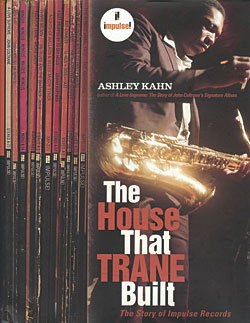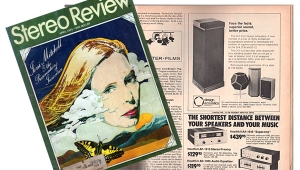| Columns Retired Columns & Blogs |
The Fifth Element #39
It's the time for giving gifts, so here's my plan: I will start off by telling you about some great new things, then remind you about some old favorites. Okay?
The right way to cover the waterfront
It is a rare and wonderful pleasure when something is done in the way it really should be done. Everyone who has read Ashley Kahn's previous books, on John Coltrane's A Love Supreme and Miles Davis' Kind of Blue, knows that he is the master of comprehensive and fascinating detail, intelligently organized and sensitively handled. The logistical advantage of those books is that you can easily acquire the one recording each discusses, and whenever you want to hear what Kahn is writing about, you merely cue up the indicated track. Peesacake.
The logistical challenge in trying to make sense of a book about the entire history of one record label, in contrast, is that unless you lived through those years and bought every new LP as it was released, your choices are: relying on unavoidably inadequate written descriptions of the music; or randomly buying a lot of records, some of which, on audition, might strike you as nothingburgers.
 So here's what makes Ashley Kahn's latest book, The House that Trane Built: The Story of Impulse Records, such a standout. Verve Music Group, which now owns the Impulse! catalog, cooperated with Kahn in the selection and production of a four-CD retrospective compilation selected from Impulse!'s entire catalog, the tracks chosen to illuminate the book's treatment of the label's history. The sequence of the tracks is roughly chronological.
So here's what makes Ashley Kahn's latest book, The House that Trane Built: The Story of Impulse Records, such a standout. Verve Music Group, which now owns the Impulse! catalog, cooperated with Kahn in the selection and production of a four-CD retrospective compilation selected from Impulse!'s entire catalog, the tracks chosen to illuminate the book's treatment of the label's history. The sequence of the tracks is roughly chronological.
If laying out 50 bucks for the four-CD set seems too risky a proposition, relax. For a measly five bucks (even less on the used market), you can get a specially priced one-CD highlights disc of tracks selected from the four CDs. The single disc serves to introduce nine different artists.
If you want to go beyond the confines of either of these two label-wide compilations, Kahn and Verve have also put together 10 individual compilation CDs covering the Impulse! careers of 10 jazz greats: Albert Ayler, Gato Barbieri, Alice Coltrane, John Coltrane, Keith Jarrett, Charles Mingus, Sonny Rollins, Pharoah Sanders, Archie Shepp, and McCoy Tyner. Each CD is titled with the artist's name and then the series title; eg, Albert Ayler: The Impulse Story. I've listened to most of them, and the selection, remastering, and liner notes are excellent. (A small degree of overlap with the label-wide compilations is inevitable.) If you want total comprehensiveness, nearly all the important Impulse! recordings have been reissued in their original form.
That, friends, is how to do it. Start with a great book about music, then offer consumers not one, but a choice among four levels of increasing depth in getting to know that music. Bravo.
From 1961 to 1977, Impulse!, which was founded as a division of the ABC media empire, was one of the most important jazz labels, if not the most important. Certainly, it was the "prestige" label in terms of budgets and support and production values, such as gatefold album covers and excellent photography and liner notes. However, as shown by the course of Impulse! founding producer Creed Taylor's later label, CTI, great cover photographs and the most expensive LP jackets in the industry can't save you if a lot of the music you put out is forgettable, lame, or both. (To be sure, CTI hit a few out of the park, Jim Hall's Concierto among them.)
The music on Impulse! was anything but lame. From Ray Charles to Gil Evans, from John Coltrane to Archie Shepp to Sonny Rollins, from Sun Ra to Keith Jarrett, Impulse! launched—or captured the defining moments of—a dizzying array of careers and styles. Over the course of more than 300 information-packed pages, Ashley Kahn manages to put the most important Impulse! releases (36 albums, each covered in its own two-page mini-chapter) into the context of not only the evolving music scene, but also into the web of business and marketing practicalities and personalities and, equally important, the context of changes in society as a whole. As per Kahn's usual high standard, there are a "discus personae," an encyclopedic discography, an in-depth bibliography, and a complete index.
To borrow Kahn's phrase, Impulse! thought like an independent and spent like a major. Does that mean that everything Impulse! put out has withstood the test of time? Nope. Humans were human, even back then. Crass calculation or unchecked egos led to a few projects that perhaps should not have been released. But only a few duds out of more than 300 LPs is quite a batting average.
The Impulse! years spanned that time when jazz was most rapidly evolving, yet when many of the most important traditionalists—such as Duke Ellington, Count Basie, Benny Carter, and Earl Hines—were still making music with their creative and technical powers largely undiminished. Impulse! managed to do justice to them all, and didn't flinch from allowing its artists to use their releases to confront current events.
Unfortunately, those who are conceived by and live by corporate agendas also die by corporate agendas. By the 1970s, ABC's recording activities overall were too diffuse, and often were poorly managed. Selling 100,000 copies of an album is quite an achievement for a Gato Barbieri project, but such figures suffered in comparison to the numbers then being racked up by ABC artists such as Steely Dan, Jim Croce, and Chaka Khan. After keeping Impulse! on, in effect, life support for a few years while trying to figure out what to do with it, ABC Records itself was sold to MCA.
Impulse! is now a division of the Verve Music Group, a subsidiary of the Universal Music Group. Praise and honors to UMG for supporting Kahn's book the way they have. If you want to give someone (especially a young person) a generous dollop of deluxe cultural literacy, it would be hard to do better than the combination of The House that Trane Built and the companion four-CD set. A new standard has been set for such ventures. Most highly recommended!
- Log in or register to post comments




































